- Home
- Anthony Trollope
The Fixed Period Page 2
The Fixed Period Read online
Page 2
CHAPTER II.
GABRIEL CRASWELLER.
I will now begin my tale. It is above thirty years since I commencedmy agitation in Britannula. We were a small people, and had notthen been blessed by separation; but we were, I think, peculiarlyintelligent. We were the very cream, as it were, that had beenskimmed from the milk-pail of the people of a wider colony,themselves gifted with more than ordinary intelligence. We were the_elite_ of the selected population of New Zealand. I think I may saythat no race so well informed ever before set itself down to form anew nation. I am now nearly sixty years old,--very nearly fit for thecollege which, alas! will never be open for me,--and I was nearlythirty when I began to be in earnest as to the Fixed Period. Atthat time my dearest friend and most trusted coadjutor was GabrielCrasweller. He was ten years my senior then, and is now thereforefit for deposition in the college were the college there to receivehim. He was one of those who brought with them merino sheep into thecolony. At great labour and expense he exported from New Zealand asmall flock of choice animals, with which he was successful from thefirst. He took possession of the lands of Little Christchurch, fiveor six miles from Gladstonopolis, and showed great judgment in theselection. A prettier spot, as it turned out, for the fattening ofboth beef and mutton and for the growth of wool, it would have beenimpossible to have found. Everything that human nature wants wasthere at Little Christchurch. The streams which watered the land werebright and rapid, and always running. The grasses were peculiarlyrich, and the old English fruit-trees, which we had brought withus from New Zealand, throve there with an exuberant fertility, ofwhich the mother country, I am told, knows nothing. He had importedpheasants' eggs, and salmon-spawn, and young deer, and black-cockand grouse, and those beautiful little Alderney cows no bigger thangood-sized dogs, which, when milked, give nothing but cream. Allthese things throve with him uncommonly, so that it may be declaredof him that his lines had fallen in pleasant places. But he hadno son; and therefore in discussing with him, as I did daily, thequestion of the Fixed Period, I promised him that it should be my lotto deposit him in the sacred college when the day of his withdrawalshould have come. He had been married before we left New Zealand, andwas childless when he made for himself and his wife his homestead atLittle Christchurch. But there, after a few years, a daughter wasborn to him, and I ought to have remembered, when I promised to himthat last act of friendship, that it might become the duty of thatchild's husband to do for him with filial reverence the loving workwhich I had undertaken to perform.
Many and most interesting were the conversations held betweenCrasweller and myself on the great subject which filled our hearts.He undoubtedly was sympathetic, and took delight in expatiating onall those benefits that would come to the world from the race ofmankind which knew nothing of the debility of old age. He saw thebeauty of the theory as well as did I myself, and would speak oftenof the weakness of that pretended tenderness which would fear tocommence a new operation in regard to the feelings of the men andwomen of the old world. "Can any man love another better than I doyou?" I would say to him with energy; "and yet would I scruple for amoment to deposit you in the college when the day had come? I shouldlead you in with that perfect reverence which it is impossiblethat the young should feel for the old when they become feeble andincapable." I doubt now whether he relished these allusions to hisown seclusion. He would run away from his own individual case, andgeneralise widely about some future time. And when the time forvoting came, he certainly did vote for seventy-five. But I took nooffence at his vote. Gabriel Crasweller was almost my dearest friend,and as his girl grew up it was a matter of regret to me that my onlyson was not quite old enough to be her husband.
Eva Crasweller was, I think, the most perfect piece I ever beheld ofyouthful feminine beauty. I have not yet seen those English beautiesof which so much is said in their own romances, but whom theyoung men from New York and San Francisco who make their way toGladstonopolis do not seem to admire very much. Eva was perfect insymmetry, in features, in complexion, and in simplicity of manners.All languages are the same to her; but that accomplishment has becomeso common in Britannula that but little is thought of it. I do notknow whether she ravished our ears most with the old-fashioned pianoand the nearly obsolete violin, or with the modern mousometor, or themore perfect melpomeneon. It was wonderful to hear the way with whichshe expressed herself at the meeting held about the rising buildingsof the college when she was only sixteen. But I think she touched memost with just a roly-poly pudding which she made with her own fairhands for our dinner one Sunday at Little Christchurch. And once whenI saw her by chance take a kiss from her lover behind the door, Ifelt that it was a pity indeed that a man should ever become old.Perhaps, however, in the eyes of some her brightest charm lay in thewealth which her father possessed. His sheep had greatly increased innumber; the valleys were filled with his cattle; and he could alwayssell his salmon for half-a-crown a pound and his pheasants forseven-and-sixpence a brace. Everything had thriven with Crasweller,and everything must belong to Eva as soon as he should have been ledinto the college. Eva's mother was now dead, and no other child hadbeen born. Crasweller had also embarked his money largely in the wooltrade, and had become a sleeping-partner in the house of Grundle &Grabbe. He was an older man by ten years than either of his partners,but yet Grundle's eldest son Abraham was older than Eva whenCrasweller lent his money to the firm. It was soon known who was tobe the happiest man in the empire. It was young Abraham, by whom Evawas kissed behind the door that Sunday when we ate the roly-polypudding. Then she came into the room, and, with her eyes raised toheaven, and with a halo of glory almost round her head as she pouredforth her voice, she touched the mousometor, and gave us the OldHundredth psalm.
She was a fine girl at all points, and had been quite alive to thedawn of the Fixed Period system. But at this time, on the memorableoccasion of the eating of that dinner, it first began to strike methat my friend Crasweller was getting very near his Fixed Period, andit occurred to me to ask myself questions as to what might be thedaughter's wishes. It was the state of her feelings rather that wouldpush itself into my mind. Quite lately he had said nothing aboutit,--nor had she. On that Sunday morning when he and his girl wereat church,--for Crasweller had stuck to the old habit of saying hisprayers in a special place on a special day,--I had discussed thematter with young Grundle. Nobody had been into the college as yet.Three or four had died naturally, but Crasweller was about to bethe first. We were arranging that he should be attended by pleasantvisitors till within the last week or two, and I was making specialallusion to the law which required that he should abandon all controlof his property immediately on his entering the college. "I supposehe would do that," said Grundle, expressing considerable interest bythe tone of his voice.
"Oh, certainly," said I; "he must do that in accordance with thelaw. But he can make his will up to the very moment in which he isdeposited." He had then about twelve months to run. I suppose therewas not a man or woman in the community who was not accurately awareof the very day of Crasweller's birth. We had already introduced thehabit of tattooing on the backs of the babies the day on which theywere born; and we had succeeded in operating also on many of thechildren who had come into the world before the great law. Some therewere who would not submit on behalf of themselves or their children;and we did look forward to some little confusion in this matter. Aregister had of course been commenced, and there were already thosewho refused to state their exact ages; but I had been long on thelookout for this, and had a little book of my own in which wereinscribed the "periods" of all those who had come to Britannula withus; and since I had first thought of the Fixed Period I had been verycareful to note faithfully the births as they occurred. The readerwill see how important, as time went on, it would become to have anaccurate record, and I already then feared that there might be somewant of fidelity after I myself had been deposited. But my friendCrasweller was the first on the list, and there was no doubt in theempire as to the exact day on
which he was born. All Britannula knewthat he would be the first, and that he was to be deposited on the13th of June 1980. In conversation with my friend I had frequentlyalluded to the very day,--to the happy day, as I used to call itbefore I became acquainted with his actual feelings,--and he neverventured to deny that on that day he would become sixty-seven.
I have attempted to describe his daughter Eva, and I must say a wordas to the personal qualities of her father. He too was a remarkablyhandsome man, and though his hair was beautifully white, had fewer ofthe symptoms of age than any old man I had before known. He was tall,robust, and broad, and there was no beginning even of a stoop abouthim. He spoke always clearly and audibly, and he was known for thefirm voice with which he would perform occasionally at some of ourdecimal readings. We had fixed our price at a decimal in order thatthe sum so raised might be used for the ornamentation of the college.Our population at Gladstonopolis was so thriving that we found itas easy to collect ten pennies as one. At these readings GabrielCrasweller was the favourite performer, and it had begun to bewhispered by some caitiffs who would willingly disarrange the wholestarry system for their own immediate gratification, that Craswellershould not be deposited because of the beauty of his voice. And thenthe difficulty was somewhat increased by the care and precision withwhich he attended to his own business. He was as careful as everabout his flocks, and at shearing-time would stand all day in thewool-shed to see to the packing of his wool and the marking of hisbales.
"It would be a pity," said to me a Britannulist one day,--a manyounger than myself,--"to lock up old Crasweller, and let thebusiness go into the hands of young Grundle. Young Grundle willnever know half as much about sheep, in spite of his conceit; andCrasweller is a deal fitter for his work than for living idle in thecollege till you shall put an end to him."
There was much in these words which made me very angry. According tothis man's feelings, the whole system was to be made to suit itselfto the peculiarities of one individual constitution. A man who sospoke could have known nothing of the general beauty of the FixedPeriod. And he had alluded to the manner of depositing in mostdisrespectful terms. I had felt it to be essentially necessary so tomaintain the dignity of the ceremony as to make it appear as unlikean execution as possible. And this depositing of Crasweller was to bethe first, and should--according to my own intentions--be attendedwith a peculiar grace and reverence. "I don't know what you calllocking up," said I, angrily. "Had Mr Crasweller been about to bedragged to a felon's prison, you could not have used more opprobriouslanguage; and as to putting an end to him, you must, I think, beignorant of the method proposed for adding honour and glory to thelast moments in this world of those dear friends whose happy lot itwill be to be withdrawn from the world's troubles amidst the loveand veneration of their fellow-subjects." As to the actual mode oftransition, there had been many discussions held by the executive inPresident Square, and it had at last been decided that certain veinsshould be opened while the departing one should, under the influenceof morphine, be gently entranced within a warm bath. I, as presidentof the empire, had agreed to use the lancet in the first two or threecases, thereby intending to increase the honours conferred. Underthese circumstances I did feel the sting bitterly when he spoke of myputting "an end" to him. "But you have not," I said, "at all realisedthe feeling of the ceremony. A few ill-spoken words, such as theseyou have just uttered, will do us more harm in the minds of many thanall your voting will have done good." In answer to this he merelyrepeated his observation that Crasweller was a very bad specimen tobegin with. "He has got ten years of work in him," said my friend,"and yet you intend to make away with him without the slightestcompunction."
Make away with him! What an expression to use,--and this from themouth of one who had been a determined Fixed-Periodist! It angeredme to think that men should be so little reasonable as to drawdeductions as to an entire system from a single instance. Craswellermight in truth be strong and hearty at the Fixed Period. But thatperiod had been chosen with reference to the community at large; andwhat though he might have to depart a year or two before he was wornout, still he would do so with everything around him to make himhappy, and would depart before he had ever known the agony of aheadache. Looking at the entire question with the eyes of reason,I could not but tell myself that a better example of a triumphantbeginning to our system could not have been found. But yet therewas in it something unfortunate. Had our first hero been compelledto abandon his business by old age--had he become doting over itsdetails--parsimonious, or extravagant, or even short-sighted in hisspeculations--public feeling, than which nothing is more ignorant,would have risen in favour of the Fixed Period. "How true is thepresident's reasoning," the people would have said. "Look atCrasweller; he would have ruined Little Christchurch had he stayedthere much longer." But everything he did seemed to prosper; andit occurred to me at last that he forced himself into abnormalsprightliness, with a view of bringing disgrace upon the law ofthe Fixed Period. If there were any such feeling, I regard it ascertainly mean.
On the day after the dinner at which Eva's pudding was eaten, AbrahamGrundle came to me at the Executive Hall, and said that he had a fewthings to discuss with me of importance. Abraham was a good-lookingyoung man, with black hair and bright eyes, and a remarkably handsomemoustache; and he was one well inclined to business, in whose handsthe firm of Grundle, Grabbe, & Crasweller was likely to thrive; butI myself had never liked him much. I had thought him to be a littlewanting in that reverence which he owed to his elders, and to be,moreover, somewhat over-fond of money. It had leaked out that thoughhe was no doubt attached to Eva Crasweller, he had thought quite asmuch of Little Christchurch; and though he could kiss Eva behindthe door, after the ways of young men, still he was more intenton the fleeces than on her lips. "I want to say a word to you, MrPresident," he began, "upon a subject that disturbs my consciencevery much."
"Your conscience?" said I.
"Yes, Mr President. I believe you're aware that I am engaged to marryMiss Crasweller?"
It may be as well to explain here that my own eldest son, as fine aboy as ever delighted a mother's eye, was only two years younger thanEva, and that my wife, Mrs Neverbend, had of late got it into herhead that he was quite old enough to marry the girl. It was in vainthat I told her that all that had been settled while Jack was stillat the didascalion. He had been Colonel of the Curriculum, as theynow call the head boy; but Eva had not then cared for Colonels ofCurriculums, but had thought more of young Grundle's moustache. Mywife declared that all that was altered,--that Jack was, in fact,a much more manly fellow than Abraham with his shiny bit of beard;and that if one could get at a maiden's heart, we should find thatEva thought so. In answer to this I bade her hold her tongue, andremember that in Britannula a promise was always held to be as goodas a bond. "I suppose a young woman may change her mind in Britannulaas well as elsewhere," said my wife. I turned all this over in mymind, because the slopes of Little Christchurch are very alluring,and they would all belong to Eva so soon. And then it would be well,as I was about to perform for Crasweller so important a portion ofhis final ceremony, our close intimacy should be drawn still nearerby a family connection. I did think of it; but then it occurred tome that the girl's engagement to young Grundle was an establishedfact, and it did not behove me to sanction the breach of a contract."Oh yes," said I to the young man, "I am aware that there is anunderstanding to that effect between you and Eva's father."
"And between me and Eva, I can assure you."
Having observed the kiss behind the door on the previous day, I couldnot deny the truth of this assertion.
"It is quite understood," continued Abraham, "and I had alwaysthought that it was to take place at once, so that Eva might get usedto her new life before her papa was deposited."
To this I merely bowed my head, as though to signify that it was amatter with which I was not personally concerned. "I had taken it forgranted that my old friend would like to see his daughter settled,and Little Christch
urch put into his daughter's hands before heshould bid adieu to his own sublunary affairs," I remarked, when Ifound that he paused.
"We all thought so up at the warehouse," said he,--"I and father,and Grabbe, and Postlecott, our chief clerk. Postlecott is the nextbut three on the books, and is getting very melancholy. But he isespecially anxious just at present to see how Crasweller bears it."
"What has all that to do with Eva's marriage?"
"I suppose I might marry her. But he hasn't made any will."
"What does that matter? There is nobody to interfere with Eva."
"But he might go off, Mr Neverbend," whispered Grundle; "and whereshould I be then? If he was to get across to Auckland, or to Sydney,and to leave some one to manage the property for him, what couldyou do? That's what I want to know. The law says that he shall bedeposited on a certain day."
"He will become as nobody in the eye of the law," said I, with allthe authority of a President.
"But if he and his daughter have understood each other; and if somedeed be forthcoming by which Little Christchurch shall have been leftto trustees; and if he goes on living at Sydney, let us say, on thefat of the land,--drawing all the income, and leaving the trustees aslegal owners,--where should I be then?"
"In that case," said I, having taken two or three minutes forconsideration,--"in that case, I presume the property would beconfiscated by law, and would go to his natural heir. Now if hisnatural heir be then your wife, it will be just the same as thoughthe property were yours." Young Grundle shook his head. "I don't knowwhat more you would want. At any rate, there is no more for you toget." I confess that at that moment the idea of my boy's chance ofsucceeding with the heiress did present itself to my mind. Accordingto what my wife had said, Jack would have jumped at the girl withjust what she stood up in; and had sworn to his mother, when he hadbeen told that morning about the kiss behind the door, that he wouldknock that brute's head off his shoulders before many days were goneby. Looking at the matter merely on behalf of Jack, it appeared tome that Little Christchurch would, in that case, be quite safe, letCrasweller be deposited,--or run away to Sydney.
"You do not know for certain about the confiscation of the property,"said Abraham.
"I've told you as much, Mr Grundle, as it is fit that you shouldknow," I replied, with severity. "For the absolute condition of thelaw you must look in the statute-book, and not come to the Presidentof the empire."
Abraham Grundle then departed. I had assumed an angry air, as thoughI were offended with him, for troubling me on a matter by referringsimply to an individual. But he had in truth given rise to veryserious and solemn thoughts. Could it be that Crasweller, my ownconfidential friend--the man to whom I had trusted the very secretsof my soul on this important matter,--could it be that he should beunwilling to be deposited when the day had come? Could it be thathe should be anxious to fly from his country and her laws, just asthe time had arrived when those laws might operate upon him for thebenefit of that country? I could not think that he was so vain, sogreedy, so selfish, and so unpatriotic. But this was not all. Shouldhe attempt to fly, could we prevent his flying? And if he did fly,what step should we take next? The Government of New South Wales washostile to us on the very matter of the Fixed Period, and certainlywould not surrender him in obedience to any law of extradition. Andhe might leave his property to trustees who would manage it on hisbehalf; although, as far as Britannula was concerned, he would bebeyond the reach of law, and regarded even as being without the paleof life. And if he, the first of the Fixed-Periodists, were to runaway, the fashion of so running would become common. We should thusbe rid of our old men, and our object would be so far attained. Butlooking forward, I could see at a glance that if one or two wealthymembers of our community were thus to escape, it would be almostimpossible to carry out the law with reference to those who shouldhave no such means. But that which vexed me most was that GabrielCrasweller should desire to escape,--that he should be anxious tothrow over the whole system to preserve the poor remnant of his life.If he would do so, who could be expected to abstain? If he shouldprove false when the moment came, who would prove true? And he, thefirst, the very first on our list! Young Grundle had now left me,and as I sat thinking of it I was for a moment tempted to abandonthe Fixed Period altogether. But as I remained there in silentmeditation, better thoughts came to me. Had I dared to regard myselfas the foremost spirit of my age, and should I thus be turned backby the human weakness of one poor creature who had not sufficientlycollected the strength of his heart to be able to look death in theface and to laugh him down. It was a difficulty--a difficulty themore. It might be the crushing difficulty which would put an end tothe system as far as my existence was concerned. But I bethoughtme how many early reformers had perished in their efforts, and howseldom it had been given to the first man to scale the walls ofprejudice, and force himself into the citadel of reason. But they hadnot yielded when things had gone against them; and though they hadnot brought their visions down to the palpable touch of humanity,still they had persevered, and their efforts had not been altogetherlost to the world.
"So it shall be with me," said I. "Though I may never live to deposita human being within that sanctuary, and though I may be doomed bythe foolish prejudice of men to drag out a miserable existence amidstthe sorrows and weakness of old age; though it may never be given tome to feel the ineffable comforts of a triumphant deposition,--stillmy name will be handed down to coming ages, and I shall be spoken ofas the first who endeavoured to save grey hairs from being broughtwith sorrow to the grave."
I am now writing on board H.M. gunboat John Bright,--for thetyrannical slaves of a modern monarch have taken me in the fleshand are carrying me off to England, so that, as they say, allthat nonsense of a Fixed Period may die away in Britannula. Theythink,--poor ignorant fighting men,--that such a theory can be madeto perish because one individual shall have been mastered. But no!The idea will still live, and in ages to come men will prosper and bestrong, and thrive, unpolluted by the greed and cowardice of secondchildhood, because John Neverbend was at one time President ofBritannula.
It occurred to me then, as I sat meditating over the tidings conveyedto me by Abraham Grundle, that it would be well that I should seeCrasweller, and talk to him freely on the subject. It had sometimesbeen that by my strength I had reinvigorated his halting courage.This suggestion that he might run away as the day of his depositiondrew nigh,--or rather, that others might run away,--had been thesubject of some conversation between him and me. "How will it be," hehad said, "if they mizzle?" He had intended to allude to the possiblepremature departure of those who were about to be deposited.
"Men will never be so weak," I said.
"I suppose you'd take all their property?"
"Every stick of it."
"But property is a thing which can be conveyed away."
"We should keep a sharp look-out upon themselves. There might be awrit, you know, _ne exeant regno_. If we are driven to a pinch, thatwill be the last thing to do. But I should be sorry to be driven toexpress my fear of human weakness by any general measure of thatkind. It would be tantamount to an accusation of cowardice againstthe whole empire."
Crasweller had only shaken his head. But I had understood him toshake it on the part of the human race generally, and not on his ownbehalf.

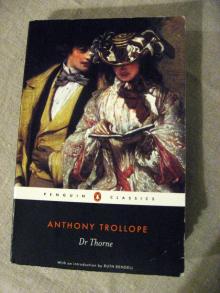 Doctor Thorne
Doctor Thorne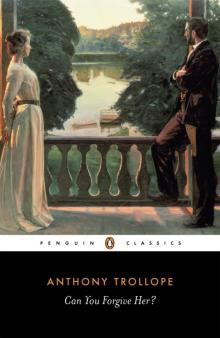 Can You Forgive Her?
Can You Forgive Her?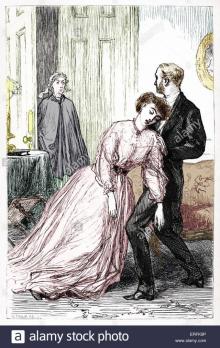 The Last Chronicle of Barset
The Last Chronicle of Barset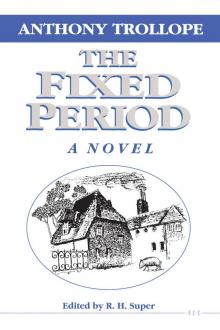 The Fixed Period
The Fixed Period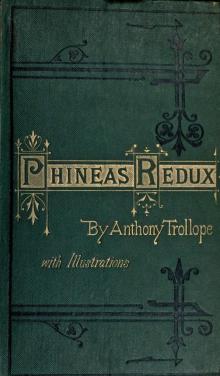 Phineas Redux
Phineas Redux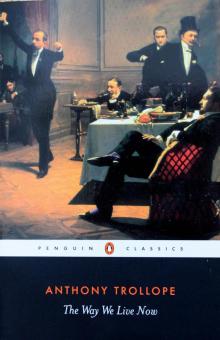 The Way We Live Now
The Way We Live Now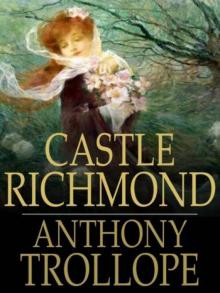 Castle Richmond
Castle Richmond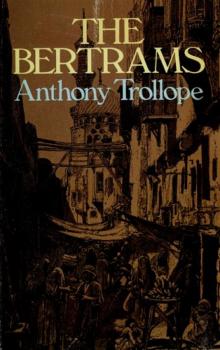 The Bertrams
The Bertrams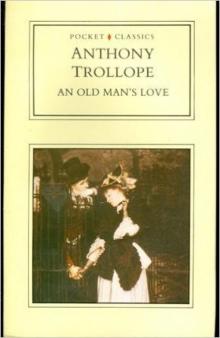 An Old Man's Love
An Old Man's Love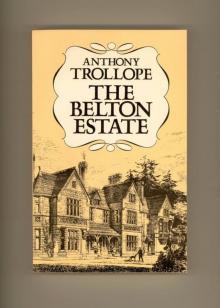 The Belton Estate
The Belton Estate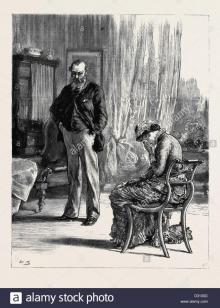 Marion Fay: A Novel
Marion Fay: A Novel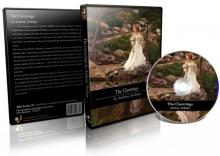 The Claverings
The Claverings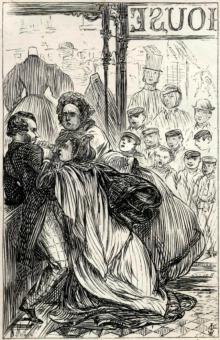 The Struggles of Brown, Jones, and Robinson
The Struggles of Brown, Jones, and Robinson Nina Balatka
Nina Balatka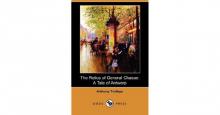 The Relics of General Chasse: A Tale of Antwerp
The Relics of General Chasse: A Tale of Antwerp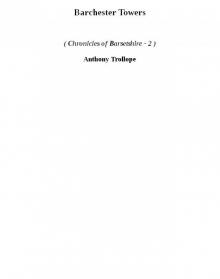 Barchester Towers cob-2
Barchester Towers cob-2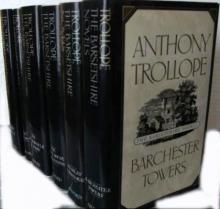 The Chronicles of Barsetshire
The Chronicles of Barsetshire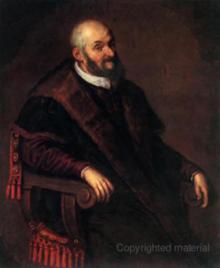 The Warden cob-1
The Warden cob-1 Framley Parsonage
Framley Parsonage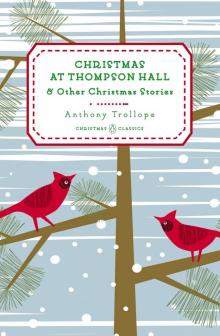 Christmas at Thompson Hall
Christmas at Thompson Hall The Warden
The Warden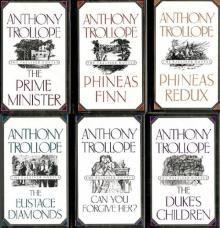 The Palliser Novels
The Palliser Novels The Small House at Allington
The Small House at Allington Barchester Towers
Barchester Towers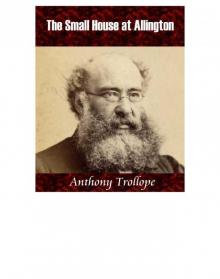 The Small House at Allington cob-5
The Small House at Allington cob-5 The Duke's Children
The Duke's Children Phineas Finn, the Irish Member
Phineas Finn, the Irish Member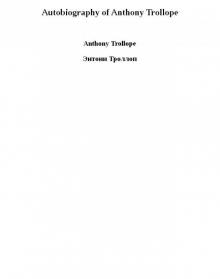 Autobiography of Anthony Trollope
Autobiography of Anthony Trollope